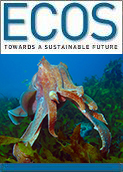
|
Published: 10 September 2013
Insurance leader, island nations highlight climate change concerns
A worldwide survey commissioned by the multinational insurance group Swiss Re to assess public attitudes towards risk has shown that climate change is ranked high on the list of people’s concerns.
The survey, conducted on behalf of Swiss Re by the Gallup polling organisation, involved 22,000 people aged 15 and above across five continents. People were asked what concerns them most - whether it’s the economy, ageing, climate change, natural disasters, energy issues or questions about food supplies.
While almost all respondents expressed fears about the economic future in their countries, concern about climate change and natural disasters was also widespread, with 84 per cent of respondents anticipating climate change being responsible for more natural disasters in the future.
Swiss Re says a majority of respondents also said they feel threatened by the risk that climate change poses to their communities. Most said they would be willing to shoulder some of the financial burden of dealing with future risks, but felt that governments should do more to meet the challenges of climate change.
The policy of governments does not fully address the risks faced today and by future generations, respondents said. In particular, more than 90 per cent of those surveyed want to see governments doing more to ensure more efficient energy use.
‘These findings show that individuals are willing to take as much responsibility as their leaders,’ says David Cole, Chief Risk Officer at Swiss Re, which commissioned the survey to mark the company’s 150th anniversary.
‘The findings are a call for better co-operation between government and the private sector. It’s vital to prepare systematically for the future and make societies more resilient. That’s where Swiss Re also plays a key role with its risk expertise.’
Large insurance companies such as Swiss Re are deeply involved in assessing the economic costs associated with changes in climate, insuring against a wide range of climate-related events that include flooding, storm damage, drought, and crop failure.
Meanwhile, at their 2013 meeting in early September, the leaders of the Pacific Islands Forum have adopted the ‘Majuro Declaration for Climate Leadership’ which, they say, captures the Pacific’s political commitment to be a region of climate leadership that can deliver a safe climate future for all.
The declaration:
-
Recognises the insufficiency of current efforts to tackle climate change, and the responsibility of all to act urgently to reduce and phase-down greenhouse gas pollution;
-
Confirms the Pacific Islands Forum’s climate leadership (the Forum includes Australia, Cook Islands, Federated States of Micronesia, Fiji, Kiribati, Nauru, New Zealand, Niue, Palau, Papua New Guinea, Republic of Marshall Islands, Samoa, Solomon Islands, Tonga, Tuvalu, and Vanuatu) in the form of their ambitious commitments to reduce emissions and the significant benefit in transitioning to renewable, clean and sustainable energy, and their desire to do more with the cooperation and support of international partners; and
-
Calls on others – including Post-Forum Dialogue Partners (Canada, People’s Republic of China, European Union, France, India, Indonesia, Italy, Japan, Republic of Korea, Malaysia, Philippines, Thailand, United Kingdom and the United States) – and other governments, cities, the private sector, and civil society to commit to be Climate Leaders by listing specific commitments that contribute more than previous efforts to the urgent reduction and phase-down of greenhouse gas pollution.
Source: Climate News Network/Pacific Islands Forum




